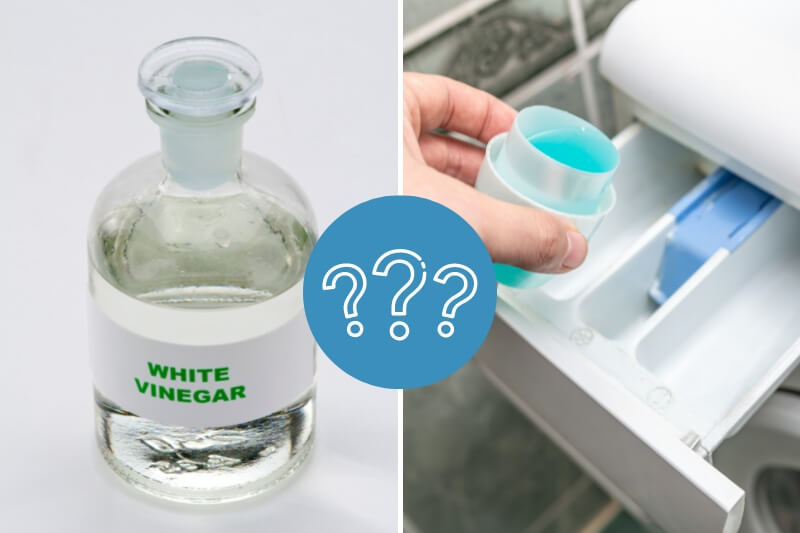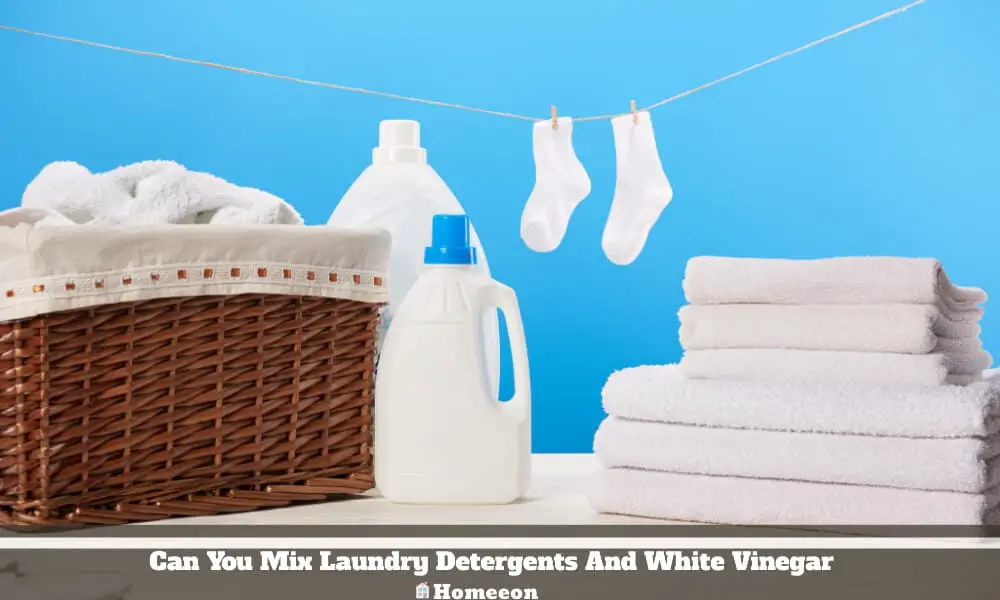Last Updated on August 1, 2023 By Emma W. Thomas
No. While you can use white vinegar and laundry detergents in the same load, you cannot mix the two. Vinegar is an acidic solution, while detergents are generally basic. Adding the two solutions together will result in a neutralization reaction which will reduce the detergent’s efficiency.
Benefits Of Using Vinegar In Laundry

White vinegar has various benefits in the laundry room, including fighting stains, removing static, and neutralizing soap residue. The following tips help achieve the maximum benefits of this product;
Vinegar As A Fabric Softener
Vinegar works perfectly well to soften the fabric and hard water. To achieve the best results of fabric softening and static reduction, you can place between 1/4 and 1/2 of white vinegar to the last rinse cycle of your washing machine. But, if you are washing comforters and blankets, you can add two cups of vinegar to the final rinse.
Vinegar As A Stain Remover
Concentrated vinegar is a great stain remover for grass, deodorant, mustard, and ketchup stains on clothing. To remove the stain, soak it in vinegar and allow it to sit for around 10 to 30 minutes, then wash normally.
Use Of Vinegar To Brighten Clothes
Vinegar is an acidic solution that works well as a clothes whitener and brightener. You can add a little vinegar (half a cup) to the final rinse to brighten your garments. You may use the softener dispenser or add it manually during the final cycle. For dingy clothes, you can boil water in a large container and add a cupful of vinegar. You will then turn off the heat, put your clothes in and leave them to soak overnight before washing normally.
Vinegar And Mildew Odors Removal
Vinegar is an excellent product when it comes to getting rid of odors like mildew and smoke. If you left your fabrics in the washer for too long until they get a mildew smell, you can add about two cups of vinegar and wash them normally. Doing this will leave your clothes smelling fresh.
Use Of Vinegar In The Removal Of Soap Residue
The use of vinegar in your laundry helps remove any detergent residue and leaves your clothes looking cleaner. You can add about a cup of vinegar in the final rinse cycle to help dissolve the soap. If you are handwashing your clothes, you can add a little vinegar (2-3 tablespoons) to the rinse water to dissolve the residual detergent.
Combating Lint In The Laundry
Vinegar helps in reducing static and making pet hair and lint less likely to stick. You will need to place half a cup of vinegar in your rinse cycle to minimize these issues.
What Happens When You Mix Laundry Detergent and Vinegar?
Mixing laundry detergent and vinegar can have different effects depending on the specific types of detergent and vinegar you use, as well as the concentrations involved. Generally, laundry detergents are alkaline, and vinegar is acidic. When combined, they may undergo a neutralization reaction. Here’s what you can expect:
- Neutralization: If you mix an alkaline laundry detergent with vinegar, which is acidic, they can neutralize each other to some extent. This means that the pH levels will tend to move closer to a neutral pH of 7. The reaction may result in the production of water and salt.
- Reduced Cleaning Power: The neutralization reaction between detergent and vinegar may reduce the cleaning power of both substances. Laundry detergents work by breaking down oils, grease, and other stains through their alkaline properties. When vinegar’s acidity neutralizes the alkaline properties of the detergent, it can hinder the detergent’s effectiveness.
- Residue Formation: In some cases, mixing detergent and vinegar might lead to the formation of a sticky or soapy residue. This can happen when the detergent’s surfactants interact with the vinegar, causing them to become less efficient at removing stains and soil from your laundry.
Given the potential negative consequences of mixing laundry detergent and vinegar, it’s generally not recommended to do so. For optimal cleaning results, it’s best to use each product separately as intended.
Precautions To Take When Using Vinegar In Laundry
While vinegar has several benefits in laundry, you need to be careful when using this product. The following precautions are worth considering;
Adding The Right Amount
Since vinegar is acidic, you need to be careful when using it to avoid spoiling your clothes. But, on average, half a cup of this product is ideal for any wash. Always use the minimum amount possible to prevent the fibers in your clothes from getting weak.
Don’t Put Vinegar On Your Clothing.
For the same reason, that vinegar is acidic, placing it directly on your garments will damage them. You need to mix this liquid with water before putting it in your clothes unless dealing with a stain. If it is a stain you are dealing with, then you can place a few drops of vinegar on the affected area and allow them to sit for a few minutes before washing off.
Does Adding White Vinegar To Laundry Kill Germs?
The acetic acid in vinegar can destroy bacteria and viruses. You can use vinegar as a disinfectant and deodorizer on your clothes by adding 1/2 a cup of this product to the final rinse cycle. Doing this will not only soften your fabric, but it will kill those pesky germs as well.
What Makes Vinegar A Good Product To Use In The Laundry?
White vinegar is a great alternative to commercial detergents in that it is environmental-friendly and also inexpensive. The following reasons make vinegar user-friendly in laundry;
No Harsh Chemicals
White vinegar does not contain harsh chemicals that could mess up your fabric. You can use this liquid to clean your clothes without the need for any detergent. All you need to do is add a half cup of distilled white vinegar to the detergent compartment of your washing machine. If your machine does not have this part, you can mix vinegar with water before putting your clothes in.
It Is Hypoallergenic
Vinegar is hypoallergenic and therefore suitable for people with sensitive skin. Unlike certain detergents that can irritate your skin, vinegar is gentle since it lacks chemicals that cause dermatitis (allergic rash).
It Is Eco-Friendly
While some laundry detergents contain harsh chemicals that are harmful to the environment, vinegar is eco-friendly. A combination of white vinegar and environmentally-safe detergents ensures the safety of plants and animals. You can add the water from your washing machine to your lawn without any fear of hurting your plants and animals.
Prevents Colors From Fading
Continued use of detergents together with sunlight and wear-and-tear may lead to the fading of the color of your fabric. You can prevent this fading by adding half a cup of vinegar to your laundry.
Cleans Your Washing Machine
The cleanliness of your laundry machine greatly impacts how clean your clothes will be. Like other household appliances, you can wash your washing machine using vinegar. Empty your machine and run it without clothes. Mix a cup of vinegar and hot water and pour in your appliance. Doing this helps to remove any detergent build-up as well as lint.
Does Vinegar React With Baking Soda?

Baking soda and vinegar should not be mixed for laundry. Vinegar is acidic, while baking soda is alkaline. Mixing the two results in bubbling as a result of a neutralization reaction. This reaction weakens the cleaning power in the baking soda.
Alkaline cleaners react by attacking the acidic household dirt and removing it. Neutralizing these substances makes them less effective in cleaning.
Conclusion
It is not advisable to mix your laundry detergents with vinegar, as doing this will neutralize the cleaning power in soap. You can use both products in the same laundry by adding vinegar to the final rinse cycle. Vinegar is an environmental-friendly substance that has several benefits.
It is also free of harsh chemicals, so anyone, including those with sensitive skin, can use it without getting irritation.
References:
https://organizing.tv/can-you-mix-laundry-detergent-and-vinegar-and-how-to/
https://inthewash.co.uk/laundry-and-ironing/vinegar-and-laundry-detergent-together/
Emma is a graduate of Domestic Science or Family and Consumer Sciences (Home Economics) from the University of Wisconsin. She has 7 years of experience Working with the strategic section of BestBuy and now writing full-time for Homeeon.
From Managing the Home, Interiors, Cleaning, and Exteriors to Gardening and everything about Making A Home Liveable – is her passion and this Homeeon is the result of this.
Emma loves decorating her home with the best stuff found online. She cares about quality over anything and writes reviews about them here in Homeeon. Get in touch with her over Pinterest.
Keep reading her blogs.
